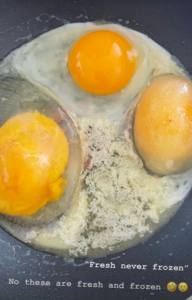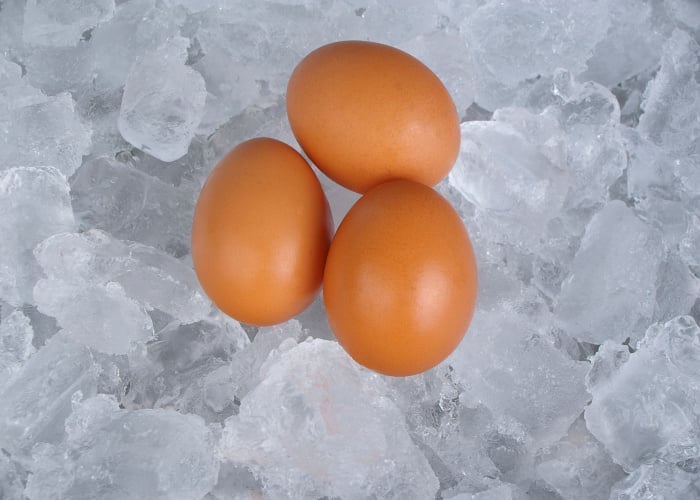Do you have an abundance of eggs?Are you looking into extending their shelf life?
Then the question,“Can you freeze eggs?”might have crossed your mind.
And you’re in luck because, yes, you can!
In fact, freezing eggs can be the most convenient method to preserve eggs for future use!
However, there are various methods and considerations to do.
In this article, we will explore different approaches to freezing eggs, address common questions and concerns, offer alternatives, and provide insights into the best practices for freezing and storing eggs.
Are you egg-cited? Let’s get started!
Can You Eat Frozen Eggs?
Yes, frozen eggs can still be safely consumedafter thawing.
However, thetexture and consistency of eggs may changeafter freezing, especially for whole eggs.
This texture change is typically minimal, and many people will not be able to tell any difference in texture.
Even fewer people have a palette capable of telling the difference in taste.
And you won’t be able to discern any difference at all for baked goods!
It’s important to note that freezing can cause the yolk and whites tobecome gelatinous or slightly grainy, which may affect their quality for certain culinary applications.
If you want to eat your eggs over easy, you may be able to tell that they were previously frozen.
Therefore, it’s recommended toconsider the intended useof the eggs after thawing.
We do offer several long-term storage alternatives in a later section.
Is It Okay To Eat Eggs That Froze and Cracked?

If you live in a colder area, you may not have temperatures above freezing for months at a time.
Even if you are on top of egg collection and check your boxes a few times a day, the odds are high that your eggs will already be frozen and cracked when you find them.
TheUSDA strongly advises discarding cracked eggs.
If the eggs froze but did not crack, the USDA says it is fine and safe to eat.
With that said, many chicken keepers who live in the north where temperatures can drop to -40°, myself included, still use these eggs — but with several precautions.
Please use your better judgment and weigh the pros and cons of these options to decide whether or not you want to eat frozen and cracked eggs.
Here are the rules I follow for eating eggs that freeze and crack in the winter:
- The eggshell can be cracked, but thesoft inner membrane should be intact.
- The egg should come from aclean eggbox. If the box has manure or several feathers in it, I feed the egg to my dog.
- The egg should beused right away and cooked fully. It’s not made into raw cookie dough, soft-boiled, or cooked as over easy breakfast eggs.
- If the egg cannot be used immediately, it getsremoved from the eggshell and frozen in the freezerin a sealed container.
- Eggs that break any of the above rules are fried and scrambled, thenfed to the chickens or our dog as a treat. We don’t feed them raw because it may encourage the hens or dogs to steal and eat eggs straight from the coop.
How Long Can You Keep Eggs in the Freezer?
When properly stored in a freezer, eggs can generally be kept forup to one year.
However, it’s important to ensure they are protected from freezer burn.
They should also be stored in airtight containers or freezer-safe bags to maintain good quality.
What Is The Best Way To Freeze Eggs?
The best way to freeze eggs depends on how you intend to use them after thawing.
For versatility, you shouldfreeze eggs in separate containersbased on their components (yolks and whites) to allow for more flexibility in your recipes.
If you want to freeze your eggs whole (egg and yolk together) but without the eggshell, try using mini silicone muffin trays.
Drop one egg in each muffin hole, and freeze the tray.
Once the eggs are solid, you can transfer them to a bag or bowl.
You can then grab individual frozen eggs while cooking for fast and convenient use.
No matter what, use freezer-safe bags or containers to prevent freezer burn.
It would be a shame to ruin your eggs because they were freezer burned!

Are There Alternatives to Freezing Eggs?
Yes, apart from freezing, there are several alternative methods to preserve eggs for the long term.
These methods includewater-glassing eggs, freeze-drying eggs, dehydrating eggs, leaving the eggs to bloom intact, pickling eggs, oiling eggs, thermostabilizing eggs,andsalting egg yolks.
These methods can provide viable options for preserving eggs based on your preferences, available space, equipment, and specific needs.
Water Glassing Eggs
Water glassingis a traditional method of egg preservation that involvessubmerging eggs in a solution of water glass (sodium silicate).
The water glass solution creates a protective coating around the egg, sealing the pores and preventing air exchange.
This method canextend the shelf life of eggs for several monthswhen stored in a cool and dark place.
This is a popular method for people with shelf space to store water-glassed eggs.
This method leaves the eggs looking, tasting, and feeling perfectly fresh, even years after they were stored away.
Freeze Drying Eggs
Freeze drying is a process that involvesremoving moisture from eggs under low temperaturesand vacuum conditions.
Thefreeze-dried eggshave a long shelf life and are lightweight and convenient for storage.
They can be rehydrated and used in various recipes, making them a popular choice for backpackers, campers, preppers, and emergency food supplies.
Dehydrating Eggs
Dehydrating eggs involvesremoving moisture from the eggs through a drying process, typically using afood dehydratoror a typical kitchen oven set at a low temperature.
Once dehydrated, the eggscan be powdered or preserved as flakes.
脱水鸡蛋有更长的保质期,be rehydrated for use in baking, cooking, or as an ingredient in powdered mixes.
The perk of dehydrated eggs is how incredibly space efficient they are.
Leaving the Egg Bloom Intact
Thebloomis a natural protective coating on the surface of fresh eggs that helps maintain their freshness and prevents bacteria from entering through the pores.
By leaving the bloom intact andnot washing the eggs, you can extend their shelf life without additional preservation methods.
Store unwashed eggs in a cool place with the pointed end facing downwardto help preserve their freshness.
On the counter at room temperature, they last for a few weeks to a few months.
In your refrigerator, they are good for six months– perhaps longer.
Pickling Eggs
Pickling eggs involvespreserving them in a vinegar-based solution,往往充满了香草,香料,或其他大海风情rings.
The eggs are hard-boiled, peeled, and immersed in the pickling solution.
The acidity of the vinegar helps inhibit the growth of bacteria and extends the shelf life of the eggs while infusing them with unique flavors.
Pickled eggsmake a tasty and tangy snack or a garnish for salads and sandwiches.
Most people who take the time to preserve eggs do a few batches of pickled eggs, but this is seldom their only preservation method.
Oiling Eggs
Oiling eggs is a preservation method where the eggs arecoated with a thin layer of oil,such asmineral oilor vegetable oil.
The oil forms a barrier that seals the pores of the eggshell, preventing air exchange and reducing moisture loss.
Oiled eggs should be stored in a cool place with the pointed end facing downward to maintain their quality and freshness.
Thermostabilizing Eggs
Thermostabilizinginvolves subjecting eggs tocontrolled heat treatmentto eliminate potential pathogens while preserving their quality and texture.
This method iscommonly used in commercial egg products, such as liquid eggs or egg powders.
The heat treatment destroys harmful bacteria, making the eggs safer for consumption, and extends their shelf life without the need for refrigeration.
Salting Egg Yolks
Salting egg yolks is a method of preserving yolks byburying them in a mixture of salt and sugar.
The salt acts as a natural preservative, drawing out moisture and inhibiting the growth of bacteria– it’s somewhat similar to salting meat.
The salted yolks become firm and concentrated in flavor, often used as a seasoning or grated over dishes for added richness.
Get Year-Round Layers
Most people who preserve their eggs do so because they expect their hens to drop their egg production for part of the year, usually in the winter.
If you want access to fresh eggs all year round without special preservation efforts, consider getting year-round layers.
Chicken breeds that lay 300 or more eggs a year are the best option.
They may drop production at some point, but you should still have a steady supply of eggs no matter what.
Golden Comets, Goldlines (Bovans Brown), ISA Browns, White Leghorns, and Rhode Island Reds are some of the best egg producers on the market.
Check out the following articles we wrote about egg-layers!
- The Sixteen Best Egg-Laying Chickens for Beginners
- The Fourteen Best Chicken Breeds for Large Brown Eggs
- The Best Chicken Breeds for Business

Freezing Eggs: FAQ
This section will address frequently asked questions about freezing eggs, such as the best way to freeze chicken eggs, freezing eggs in the shell, freezing hard-boiled eggs, and long-term egg preservation methods.
What Is The Best Way to Freeze Chicken Eggs?
The best way to freeze chicken eggs is byseparating the yolks and whites.
Crack the eggs into a bowl, gently whisk them, and then pour them into freezer-safe containers or ice cube trays.
Label the containers with the number of eggs and dates, and freeze them.
What Happens When You Freeze Eggs in the Shell?
If you freeze eggs in the shell, the shell will crack and burst.
The egg could be contaminated and will definitely leave you with a mess to clean up.
It is not recommended to freeze eggs whole in the shell.
Can You Freeze Whole Chicken Eggs in the Shell?
Do not freeze whole chicken eggs in the shell because the shell will break, make a mess, and potentially contaminate the egg.
Can You Freeze Chicken Eggs for Later Use?
With proper methods, you can safely freeze eggs for later use.
Separate the whites from the yolks to freeze, or crack the eggs into muffin tins to freeze.
Once the eggs are frozen, transfer them to freezer-safe containers that won’t freeze burn.
Can You Freeze Hard-Boiled Eggs in the Shell?
It is not recommended to freeze hard-boiled eggs in the shell.
Freezing can cause the liquid inside the eggs to expand, resulting in the shells cracking.
It’s best topeel the hard-boiled eggs before freezing.
Pat the boiled eggs dry before placing them in a bag or bowl.
Otherwise, they may stick to each other and the container.
How To Preserve Eggs Long-Term?
For long-term egg preservation, water glassing, pickling, oiling, or freezing can be considered.
Water glassing involves submerging eggs in a solution of water glass (sodium silicate) to create a protective coating.
Pickling eggs involves preserving them in a vinegar-based solution.
Oiling eggs involves coating them with a thin layer of oil to seal the pores and prevent air exchange.
These methods can extend the shelf life of eggs from several months to several years when stored properly.
Can You Freeze Eggs: Final Thoughts
In conclusion, freezing eggs can be a viable method for preserving them and extending their shelf life.
By separating the yolks and whites and using proper freezer-safe containers, you can maintain the quality of eggs for future use.
Freezing whole eggs in the shell is not recommended due to the risk of cracking and potential contamination.
While frozen eggs can still be safely consumed after thawing, it’s important to note that the texture and consistency may be altered, especially for whole eggs.
记得要遵守建议的指导方针,探索alternative preservation methods if desired, and always prioritize food safety when handling and consuming frozen eggs.
Want to know more about eggs? Check out our recommendations below!



